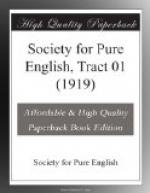VI. As to idiomatic pronunciation involving speech-rhythm. The literary taste of the eighteenth century, as typified in Dr. Johnson, consciously discredited idioms which it held to be ungrammatical; and this error persists. A simple instance is the growing loss of our enclitics. The negative not was enclitic after the verb, and this gave us our shan’t, don’t, won’t, &c. Dr. Johnson held the not to be too important a qualification to leave unaccented. Again, where prepositions made a pronoun enclitic, the old accent is perishing. For it, which used to be pronounced forrit as one word, is now generally spoken faw it, as two. The result of such conscious pedantries is not only a great damage to the rhythmic beauty of our older literature, actually teaching the folk to misread the admirable prose of our Bible, but it is a bungling interference with the natural evolution of our sentences, as we mould them to our convenience. We would trust the general ear in such questions of syllabic rhythm, and would protect as far as possible the old harmonious cadences of our traditional speech.
We have no present intention of engaging in the vexed question of the illogical and often absurd orthography of English. Members of the Society would perhaps desire some relaxation of these bonds, but we think it better to concentrate on other profounder modifications of the language which, though of first importance, are receiving no special attention. We are aware that proposals for violent change often defeat their own end, and make all reform impossible. We shall therefore not insist on any doubtful or disputable detail as a rule of correctness; but we shall rely on suggestion, believing that we shall attain the best results by causing those who lead the fashion to consider the problems and think them out for themselves. We are convinced that by this means an ideal of self-harmonized speech will be gradually approved, and will spontaneously create a better standard of national taste, to which the future developments of the language may be safely entrusted.




